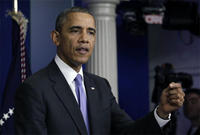-
Badly engineered missile defense systems deployed “because there was a rush”
In 1983 President Ronald Reagan launched the Strategic Defense Initiative (SDI) to build space- and ground-based missile defense systems. The space-based component was abandoned as impractical, and the focus shifted to Ground-based Midcourse Defense systems (GMD). Despite disappointing results and program test failures, Congress and the George W. Bush administration pressed forward with spending billions on acquiring systems of questionable reliability. “We recognize the problems we have had with all the currently fielded interceptors,” Undersecretary of Defense Frank Kendall old an industry gathering in February 2014. “The root cause was a desire to field these things very quickly and very cheaply; we are seeing a lot of bad engineering, frankly, and it was because there was a rush.”
-
-
A bill offers a military path to citizenship for Dreamers

The Enlist Act,authored by Representative Jeff Denham (R-California) would allow immigrants who were brought to the United States illegally before 2012 and below the age of fifteen at the time (Dreamers) to enlist in the military, earning them permanent legal status, and upon honorable discharge, eligibility for U.S. citizenship. Denham and his co-sponsors tried to get the proposal though the National Defense Authorization Act(NDAA), a bill likely to pass, but House leaders rejected the idea.
-
-
Critics say $265 billion transportation bill insufficient
Transportation advocates criticize the lack of an increase in funding in the Senate’s $265 billion surface transportation bill recently unveiled. Senate leaders said the bill would replace the current transportation funding measure and maintain current funding levels, adjusted for inflation, for the next six years. The proposed bill includes $44 billion annually for road and transit projects, based on a Congressional Budget Office(CBO) estimate of how much funding will be needed to maintain current federal transit programs. The CBC has projected that Department of Transportation’s Highway Trust Fund will run out of money by August 2014 without congressional action.
-
-
Bill would encourage development of drugs to treat antibiotic-resistant bacteria
The U.S. Centers for Disease Control and Prevention(CDC) reported that two million Americans are infected by antibiotic-resistant pathogens every year, and the pathogens cause 23,000 deaths annually. In 1990, about twenty pharmaceutical companies had large antibiotic research and development programs, but today only three large firms and a few small companies are investing in antibiotic research. A new proposed bill, the Developing an Innovative Strategy for Antimicrobial Resistant Microorganisms Act, would encourage pharmaceutical companies to develop new drugs to treat antibiotic-resistant bacteria.
-
-
Lawmakers want safer waste storage at nuclear plants
Lawmakers on Tuesday introduced a set of bills aimed at improving the safety and security of nuclear power plants’ waste in the event of a natural disaster or terrorism. One of the bills would require nuclear power plant operators to accelerate the transfer of nuclear waste stored in spent fuel pools into dry cask storage units. Current Nuclear Regulatory Commission(NRC) regulations allow spent fuel to remain in spent fuel pools until the reactor completes decommissioning, which can take as long as sixty years. Another bill would stop the NRC from issuing exemptions to its emergency response and security requirements for reactors that have been permanently decommissioned.
-
-
Cybersecurity bill not likely before a crisis proves its necessity
A recent simulation, with 350 participants from congressional staffs, the cybersecurity sector, and the U.S. military, examined whether or not Congress was capable of passing a comprehensive cybersecurity legislation to protect the country’s critical infrastructure from debilitating cyberattacks. The simulation participants concluded that Congress is not likely to act unless there is a major cyber crisis, and that until such crisis occurs, smaller measures, such as the president’s voluntary cybersecurity framework, are the best that can be hoped for.
-
-
Industry, Democrats reject GOP-sponsored TRIA-extension draft
House democrats and members of Property Casualty Insurers, a leading insurance trade group, have rejected a Republican-sponsored draft proposal which would alter some measures of the current Terrorism Risk Insurance Act (TRIA). The Property Casualty Insurers did not mince words, calling the GOP plan “unworkable for the marketplace.” The proposal would raise the amount of damage caused by a terrorist attack from the current $100 million to $500 million before government coverage is triggered (the higher threshold would apply to attacks which do not involve nuclear, biological, chemical, or radiological means).
-
-
Congress urged to renew the Terrorism Risk Insurance Act
The Terrorism Risk Insurance Act (TRIA) is set to expire at the end of 2014 and members of Congress are urging its reinstatement before it is too late. The bill was enacted in 2002 in response to 9/11, and requires private insurers to offer terrorism coverage to individuals, with government assistance should the total payout from an event exceeds $100 million.
-
-
Chemical plant security measure moves forward in the House
The House Homeland Security Committee and the House Energy and Commerce Committee are making progress on legislation meant to extend DHS’s Chemical Facility Anti-Terrorism Standardsprogram, which helps secure commercial chemical plants from terrorist attacks. Several attempts by the House Homeland Security Committee to extend the program have failed due to disagreements with the House Energy and Commerce Committee, which also oversees the matter.
-
-
House mulls Syria-related sanctions on Iran

U.S. House legislators are considering new terrorism-related sanctions on Iran, targeting the country’s support for Hezbollah, after ceding to the Obama administration’s request to back off on sanctions related to Iran’s nuclear program. The House Foreign Affairs Committee hopes the move will reflect their independence from the White House and also bring more focus to the Syrian crisis.Lawmakers say the bill would reflect the most effective ways to disrupt Iran’s financial support of Hezbollah.
-
-
9/11 terror network in U.S. was never fully dismantled, still a threat
A joint inquiry co-chaired by a former senator has warned that the American network that supported and trained the 9/11 hijackers was never fully dismantled, and that it remains a threat, pending the release of a secret report from the era. Former Senator. Bob Graham (D-Florida) points out that a 28-page section from the “Joint Inquiry into Intelligence Community Activities Before and After the Terrorist Attacks of September 11, 2001” was classified under President George W. Bush and remains so under President Barack Obama.
-
-
Debate intensifies over Obama deportation instruction to ICE
President Barack Obama’s recent instruction to DHS to find “more humane” ways to deport illegal immigrants has sparked yet another debate between immigration supporters and critics as to what exactly Obama’s directive meant. Supporters of undocumented immigrants hope DHS will cease all deportations deemed unnecessary, while opponents of Obama’s immigration policies urge DHS to carry out the country’s immigration laws as written by Congress.
-
-
W.Va. spill leads lawmakers, industry to look at reforming toxic substances law
The government was slow to respond to the 9 January 2014 massive chemical spill in West Virginia because the law governing such response, the 1976 Toxic Substances Control Act (TSCA), limits regulatory agencies’ authority to investigate such spills.Under TSCA, the EPA must first prove that a chemical poses an unreasonable risk to health or the environment before it can require the needed testing that would show a potential risk. One observer called this a Catch-22, telling a congressional panel that “This is like requiring a doctor to prove that a patient has cancer before being able to order a biopsy.”
-
-
Obama uses executive power to changes immigration policy

President Barack Obama is using executive power to tackle the country’s immigration issues while Congress makes little progress on immigration overhaul. The president issued executive orders prohibiting deportations of individuals who arrived in the United States illegally as children, individuals who care for children, and individuals who have no criminal records. Recently, some relatives of military service members living in the country illegally have been allowed to remain in the country as a way to lessen stress on the military and reward veterans.
-
-
Acting DHS IG, under investigation, steps down

Charles K. Edwards, the embattled DHS acting inspector general, yesterday stepped down from his position and took another job in the department. Edwards was under investigation after allegations emerged that he misused his office and softened reports to keep from embarrassing the Obama administration. Late last month, the White House nominated John Roth, a criminal investigator at the Food and Drug Administration, to become the permanent inspector general.
-
- All
- Regional
- Water
- Biometrics
- Borders/Immig
- Business
- Cybersecurity
- Detection
- Disasters
- Government
- Infrastructure
- International
- Public health
- Public Safety
- Communication interoperabillity
- Emergency services
- Emergency medical services
- Fire
- First response
- IEDs
- Law Enforcement
- Law Enforcement Technology
- Military technology
- Nonlethal weapons
- Nuclear weapons
- Personal protection equipment
- Police
- Notification /alert systems
- Situational awareness
- Weapons systems
- Sci-Tech
- Sector Reports
- Surveillance
- Transportation
Advertising & Marketing: advertise@newswirepubs.com
Editorial: editor@newswirepubs.com
General: info@newswirepubs.com
2010-2011 © News Wire Publications, LLC News Wire Publications, LLC
220 Old Country Road | Suite 200 | Mineola | New York | 11501
Permissions and Policies
Editorial: editor@newswirepubs.com
General: info@newswirepubs.com
2010-2011 © News Wire Publications, LLC News Wire Publications, LLC
220 Old Country Road | Suite 200 | Mineola | New York | 11501
Permissions and Policies
